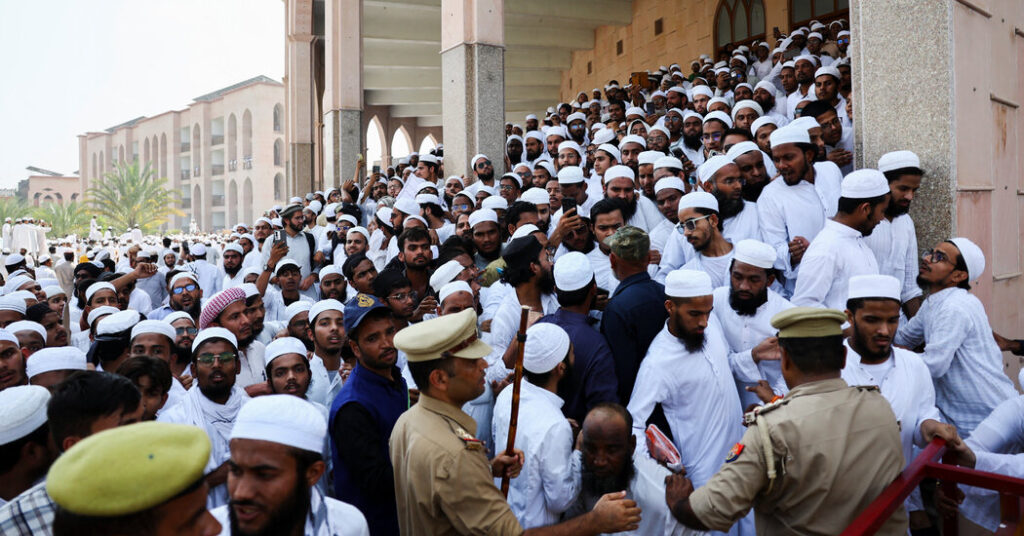The Afghan Taliban foreign minister arrived at the Islamic seminary to a rock star’s welcome. Students and teachers swarmed around his limo. Crowds of people streamed past me just to catch a glimpse of him.
But this was not in Afghanistan. The seminary he was visiting was in India, a country that had long kept its distance from the Taliban during their decades as an insurgency that New Delhi saw as a proxy for its archenemy, Pakistan.
During his first official visit to India last month, the Afghan foreign minister, Amir Khan Muttaqi, received the warmest welcome. He stood for photographs with officials in New Delhi after they promised to elevate India’s mission in Kabul to a full embassy for the first time in years. And I watched him openly beaming during his pilgrimage to the Deoband seminary in northern India, the spiritual source of the Taliban’s twinned creeds of conservative religion and holy war.
The whole visit seemed to be a message of defiance to Pakistan’s powerful military, once the benefactors of the Taliban’s insurgency in Afghanistan, but increasingly at odds with them now that the movement is in power in Kabul.
Through the years, Pakistan has taken any overture toward India as an inherently hostile act, and Mr. Muttaqi’s visit clearly crossed some line. Within hours of his arrival in India, Pakistan’s military was conducting airstrikes on the Afghan capital, an unprecedented escalation between the former allies that set off a wave of tit-for-tat violence and put both countries on a kind of war footing for a week.
Pakistani officials accuse Afghanistan’s rulers of supporting a resurgent Pakistani Taliban offensive by hosting and sheltering militants who have struck again and again at the security forces within Pakistan.
While Afghan officials deny that support, saying that the attacks within Pakistan are by internally inspired militants, they readily acknowledge a kinship with the Pakistani Taliban. Both groups are largely ethnic Pashtun, and both have common ties to the offshoots of the original Deoband seminary that Mr. Muttaqi visited.
The Deobandi schools in Pakistan cropped up after India’s partition in 1947 and later, with the aid of C.I.A. and Saudi money pumped into the region to defeat the Soviet invasion of Afghanistan, helped fuel the jihadi creed that became the Afghan Taliban.
Now, the legacy of that ideology, which repeatedly rallied neighbors to fight invaders, has grown increasingly messy and is dividing the former allies.
That Pakistan would now be facing its own persistent jihadi militancy problem after the Afghan Taliban’s victory over the U.S.-backed Afghan government in 2021 is a result predicted by many analysts — and long feared within Pakistan itself. But the sheer speed of degeneration of relations between the neighbors has surprised many.
“They created their own Frankenstein, and they thought they could control them,” said David B. Edwards, a professor of anthropology at Williams College who has chronicled the rise of Islamic militancy in Afghanistan and Pakistan. He was referring to Pakistan’s military intelligence agency, which initially supported the Taliban insurgency and now combats one.
Mr. Edwards said the clash between the two governments is a reminder of a more fundamental territorial dispute that had been pushed to the background during decades of conflict in Afghanistan, but never gone away: The Afghan side never fully accepted the 19th-century boundary drawn by the British that split the Pashtun tribes between Afghanistan and what is now Pakistan.
In the wake of recent military escalation, leaders of the Taliban government have resorted to rhetoric showing that cross-border Pashtun nationalism has not been tempered by decades of support and ideological injection from Pakistan.
The Taliban’s deputy interior minister, Mohammad Nabi Omari, who spent a decade in U.S. detention at Guantánamo Bay, has ridiculed Pakistan’s prime minister as a puppet of President Trump. And he used a pejorative term for Pakistani soldiers killed by Taliban fire that the Taliban in the past would use to describe American soldiers or security forces of the Afghan republic.
“God is creating a pretext for that old territory of Afghanistan that is left with them, on that side of a theoretical boundary, to be returned to us,” he told a public gathering in Afghanistan last month.
The red carpet welcome in India for the Taliban foreign minister, who required an exemption from U.N. sanctions to be able to travel, in the middle of the escalation suggested that India was hoping to exploit the tensions. And Afghan officials are publicly demonstrating that they reject any dependence on Pakistan, even religiously or ideologically.
The 135-year-old Deoband seminary that Mr. Muttaqi visited was an important wellspring of conservative Islam for visiting Afghan scholars before its post-independence offshoots in Pakistan took precedence in recent decades. The school emphasized fundamentalist religious teachings over modern sciences, and its followers played an active role in the Indian independence movement against British colonialism.
Last month, leaders of the seminary beamed in pride at reconnecting with Afghan rulers who look up to their ideology. They refused to discuss some of the harshest measures of the Taliban government, including banning girls’ education beyond sixth grade, in the name of that ideology.
“Deoband is like the mother of our knowledge,” Mr. Muttaqi told a large gathering of students and teachers in one hall.
Opinion in Pakistani religious circles has been divided over Mr. Muttaqi’s trip to India. Leaders of the Haqqania madrasa in Pakistan, where he is an alumnus, described the red carpet welcome “of our proud son” as a celebration of the victory of “a long chain of jihadi sacrifice.”
Others, like the Peshawar-based religious scholar Tayyab Qureshi, saw it an expression of ungrateful Taliban seeking new patrons.
“Muttaqi, who learned his religious scholarship and even his Urdu language here in Pakistan, not in Deoband, needs to remember the sacrifices Pakistan paid in their support,” Mr. Qureshi said. “New Delhi is tactfully leveraging the friction between Islamabad and Kabul to advance its own agenda.”
Administrators at seminaries in Pakistan said that Afghan enrollment has dwindled over the past three years, after the Taliban administration set up hundreds of new seminaries of its own across Afghanistan, and Pakistan pushed Afghan refugees back in large numbers.
Now, a month after Mr. Muttaqi’s visit, Afghanistan and Pakistan are still seething at each other. And tensions have risen again between India and Pakistan after deadly bombings a day apart in each capital last week. Some analysts fear that a cycle of blame could bring those nuclear-armed neighbors back toward hostilities just a few months after the cease-fire that halted their alarming four-day military conflict.
In Afghanistan, leaders continue their defiant talk against Pakistan. They make little secret that their ties with the Pakistani Taliban, including their shared bond of conservative ideology, trumps any gratitude to Pakistan’s establishment for its past help.
In his public address last month, Mr. Omari, the Afghan deputy interior minister, warned Pakistan against any further military action. And he flexed the Taliban’s asymmetrical victory against American military might, wondering aloud whether Pakistan might be next.
“You may have airplanes and tanks, but we have the kind of fighters who are sitting here itching for when jihad will begin again,” he said. “Because, when you are addicted to, say, chewing tobacco — excuse my language — you can’t quit so easily.
“Our fighters are used to these wars over the past 20-25 years,” he said, “and they are wishing for another war to be rewarded with martyrdom.”
Zia ur-Rehman contributed reporting from Islamabad.
Mujib Mashal is the South Asia bureau chief for The Times, helping to lead coverage of India and the diverse region around it, including Bangladesh, Sri Lanka, Nepal and Bhutan.
The post At a Shared Symbol of Jihad, the Taliban Defy Their Old Ties With Pakistan appeared first on New York Times.




